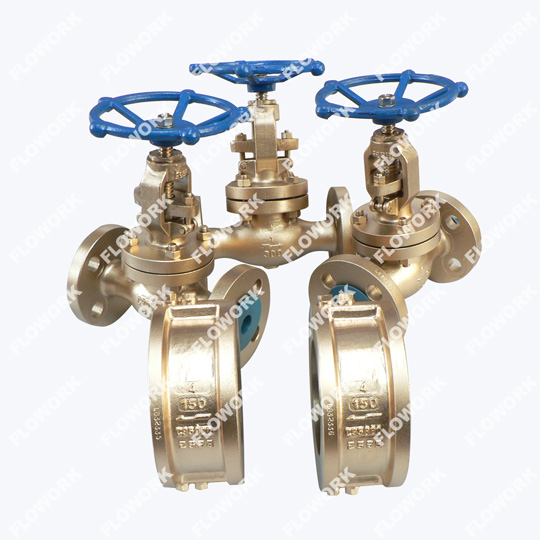
1、You are in restricted area and need password. Please Contact us to obtain documents.
2、PasswordIf you have any questions about quotation or cooperation, please feel free to send us inquiry. Inquiry us
| Size: | 2"-24" |
| Pressure: | 150LB-2500LB |
| Body Material: | C95800, C95500, C95200, C95300, C95600, C61900, C63200, etc. |
| Seal Material: | Integral seal |
| Connection Type: | Flanged, Butt Welded, Socket Welded, NPT, Wafer, Lug |
| Operation: | Handwheel, hand lever, gear operated, pneumatic, motorized |
| Face to Face Dimension: | ASME B16.10 |
| Flange End Dimension: | ASME B16.5 |
| Butt Welded Dimension: | ASME B16.25 |
| Design and Manufacture: | API 600 |
| Test Standard: | API 598, API 607, API 6FA, ISO 15848-1-2 |
Bronze valve material contains tin bronze valve, lead bronze valve, aluminum bronze valve, beryllium bronze valve and phosphor bronze valve.
Tin bronze valves have good casting performance, anti-friction and mechanical properties.
Aluminium bronze valve has high intensity, good abrasion resistance and corrosion resistance, fugitive emission gate valve.
The pressure range is from 150LB to 900LB.
Beryllium bronze valves and phosphor bronze valves have high elasticity and good electrical conductivity.
Bronze and brass valves are both commonly used in plumbing and industrial applications, but they have some key differences.
Bronze valves are made primarily of copper, with varying amounts of tin and other elements. They are known for their excellent corrosion resistance, making them suitable for use in water and steam applications. Bronze valves are also durable and have good heat resistance. They are often used in plumbing systems, marine applications, and in environments where corrosion is a concern. api 6d ball valve
Brass valves, on the other hand, are made primarily of copper and zinc. They are known for their strength, durability, and ease of machining. Brass valves have good resistance to dezincification, a form of corrosion that can occur in brass alloys. They are commonly used in plumbing systems, gas applications, and in environments where high temperatures and pressures are present. forged ball valve
In summary, the main difference between bronze and brass valves lies in their composition and specific properties. Bronze valves offer excellent corrosion resistance, while brass valves are known for their strength and durability. The choice between the two depends on the specific application and the requirements of the system.
Bronze valves are commonly used in plumbing systems, marine applications, and in environments where corrosion is a concern. They are also used in steam and water applications, as bronze has excellent corrosion resistance and can withstand high temperatures. Bronze valves are often used in applications where the valve will be exposed to saltwater or other corrosive substances, such as in marine environments or in chemical processing plants. Additionally, bronze valves are often used in fire protection systems, as they are resistant to heat and can withstand high pressure. Overall, bronze valves are a versatile and reliable choice for a wide range of applications where corrosion resistance and durability are important factors. carbon steel gate valves
The frequently used materials for bronze valves are primarily copper, with varying amounts of tin and other elements. Copper is the main component of bronze valves and provides the base for their properties. Tin is commonly added to bronze to improve its strength, hardness, and corrosion resistance. Other elements that may be present in bronze valves include aluminum, silicon, and phosphorus, which can further enhance specific properties such as machinability and wear resistance. The exact composition of bronze valves can vary depending on the specific application and desired characteristics. However, copper and tin are the main elements that make up the majority of bronze valve materials. high temperature gate valves
Bronze valves offer several advantages over other types of valves. Firstly, bronze has excellent corrosion resistance, making it ideal for use in environments where the valve will be exposed to saltwater or other corrosive substances. Secondly, bronze valves are durable and can withstand high temperatures and pressures, making them suitable for use in a wide range of applications. Thirdly, bronze is a good conductor of heat and electricity, which can be beneficial in certain applications. Fourthly, bronze valves are relatively easy to machine and can be manufactured to precise specifications. Finally, bronze is a cost-effective material, making it a popular choice for many applications. Overall, the advantages of bronze valves make them a versatile and reliable choice for a wide range of industries and applications, duplex stainless steel ball valve.
Send us a message if you have any questions or request a quote.

A reply from our experts within 24 hours

The latest detailed product catalugue

One-stop service for your project